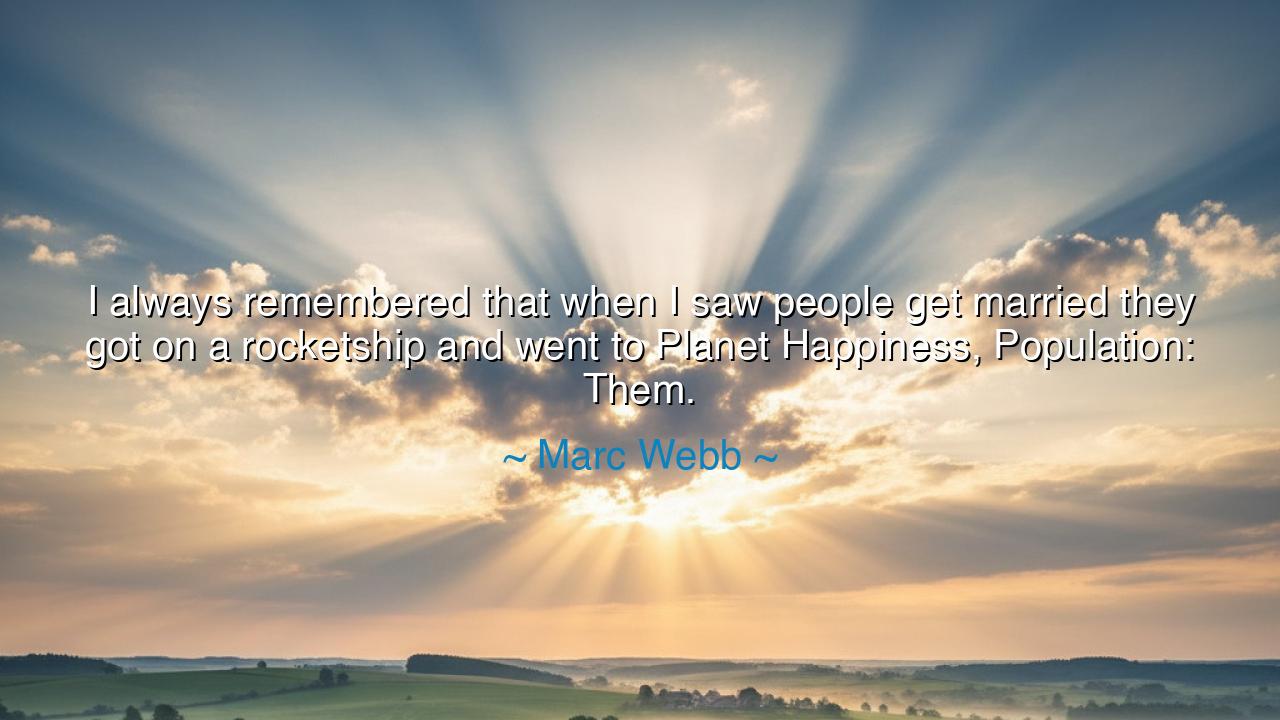
I always remembered that when I saw people get married they got
I always remembered that when I saw people get married they got on a rocketship and went to Planet Happiness, Population: Them.






The words of Marc Webb—“I always remembered that when I saw people get married they got on a rocketship and went to Planet Happiness, Population: Them.”—are spoken with a poet’s wit and a child’s wonder, yet beneath their playful tone lies a deep truth about the mystery of love and the sanctity of marriage. He envisions the union of two souls not as a mere contract or ceremony, but as a cosmic journey. In marriage, a man and a woman—or two beloveds—step onto a vessel and launch into a realm that belongs to no one else. It is a private world, a place apart, a planet whose population is limited to the two who have chosen to bind their destinies together.
This rocketship is the symbol of departure from the common world. For once vows are spoken, the lovers are no longer merely individuals walking separate paths; they become a single voyage, a shared orbit. Their joys, their sorrows, their daily labors become enclosed within a new universe. Outsiders may look upon them with curiosity or admiration, but they cannot dwell within this world. To the married, the crowd outside is distant stars; to the married, the intimacy of Planet Happiness is enough. Thus Webb captures the awe of marriage, as though it were not only a union of flesh and spirit, but a voyage beyond the reach of all others.
History offers luminous examples of such worlds created by love. Think of Queen Victoria and Prince Albert. Their marriage, though royal in ceremony, was deeply personal in devotion. Together they built a private world in which they found solace from the burdens of empire. After Albert’s early death, Victoria mourned him with a grief that lasted a lifetime, for her “planet” had lost its other inhabitant. The lesson is clear: when two people enter such a union, they create something unique, something irreplaceable, a world sustained only by the bond of those who inhabit it.
Yet Webb’s vision also carries a warning. Planet Happiness is not reached merely by stepping onto the rocketship of marriage. The journey requires constant tending, patience, and sacrifice. If the two who board the vessel grow careless, if they fail to nurture love, then their planet may fall into ruin. The beauty of a private world is also its fragility: no one else can sustain it for them. It is both sanctuary and responsibility, a realm of joy that must be cultivated every day.
There is also a deeper symbolism in the population of two. In that sacred space, love teaches us what it means to belong wholly to another. It strips away the need for applause, the hunger for validation, the grasping for power. On this planet, one does not reign over the other; both reign together in peace. It is a reminder that true happiness is not found in numbers, wealth, or crowds, but in the steady presence of one soul who shares the voyage with you.
So what lesson shall we carry from these words? That love, when consecrated in marriage, is a world unto itself, and it demands our reverence. If you are bound to another, remember that you now dwell on Planet Happiness, where your words, your actions, your care, and your forgiveness shape the very air you breathe. Protect this world, for it is yours alone. Do not let outsiders invade it with bitterness, nor neglect cause it to wither. Choose each day to remain astronauts of love, still willing to launch into joy together.
Practical wisdom flows from this: cherish your beloved as though you two are alone in the universe. Build rituals of togetherness—meals shared, silences embraced, dreams spoken aloud. When conflicts arise, remember that no third soul lives on your planet; it is for you alone to resolve. And above all, keep alive the sense of wonder—the awe that Webb felt as he watched marriages lift into the heavens. For marriage, at its best, is not ordinary life—it is a rocketship, it is a planet, it is the miracle of two hearts creating a universe that no other can enter.
Thus, let the words of Marc Webb echo in our hearts: to love truly is to leave the crowd behind and dwell in a world of two, sustained by faith, warmed by joy, and illuminated by the eternal light of companionship. This is the voyage of marriage, and it is both a privilege and a destiny.






AAdministratorAdministrator
Welcome, honored guests. Please leave a comment, we will respond soon